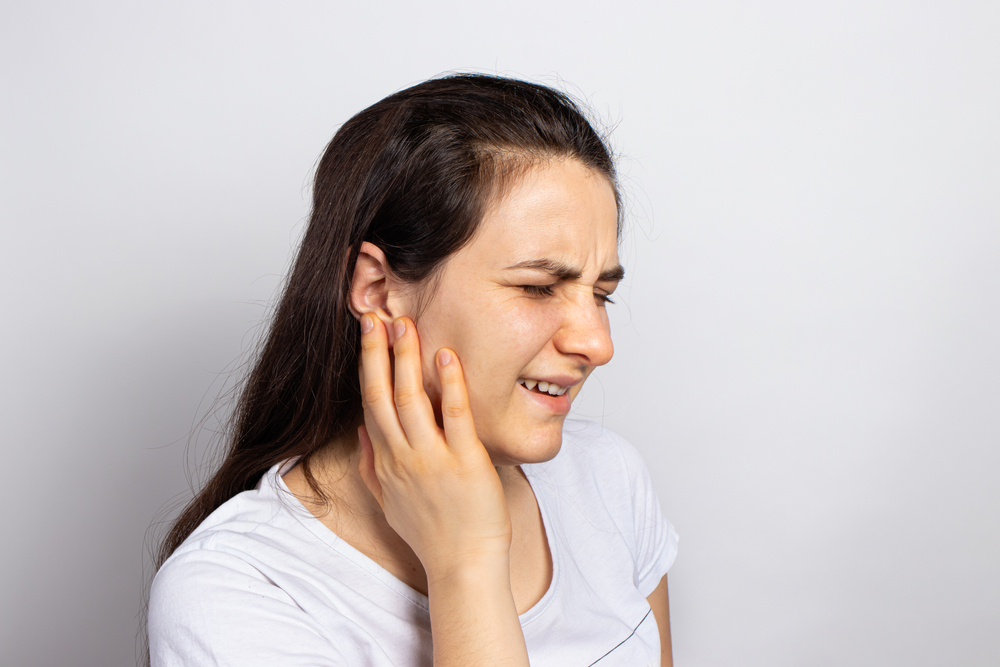 Everyone who had an ear infection as a child understands how unique and debilitating ear pain can be. But if you are experiencing ear pain and can’t close your jaw as an adult, things can be more complicated than just needing a round of antibiotics to make a full recovery.
Everyone who had an ear infection as a child understands how unique and debilitating ear pain can be. But if you are experiencing ear pain and can’t close your jaw as an adult, things can be more complicated than just needing a round of antibiotics to make a full recovery.
Several different conditions can cause this combination of symptoms. Because of the way the jaw and ear are connected, issues with one can easily affect the other.
In this article, we will discuss the potential causes of ear pain coupled with an inability to close your jaw and explore the importance of both proper diagnosis and treatment so you can get back to your life without pain and distraction.
Symptoms
There can be a range of common symptoms when ear pain is accompanied by trouble closing the mouth. These include:
- Jaw pain, aching pain in or around the ear, and aching facial pain.
- Difficulty opening the mouth thoroughly.
- Difficulty or discomfort while chewing.
- A clicking sound or popping sensation in the jaw joint.
- Locking of the joint that makes it hard to open or close the mouth.
- Headache.
- Uncomfortable bite.
- An uneven bite is caused by one or more teeth making contact with each other before the other teeth do.
What Can Cause This?
While many conditions can contribute to ear pain and jaw issues, these are some of the common culprits:
- Temporomandibular Joint Disorder (TMJD) – The temporomandibular joint (TMJ) connects the jawbone to the skull. These joints enable the jawbone to rotate and slide. As you can imagine, these joints are very busy, allowing us to speak, chew, yawn, and swallow. If the TMJ gets swollen, it can cause ear pain and jaw issues. TMJ is the most common cause of ear pain in adults, making it difficult to open or close the mouth thoroughly.
- Arthritis – Multiple forms of arthritis can cause ear and jaw issues. Osteoarthritis, rheumatoid arthritis, and psoriatic arthritis can all affect the jaw and cause ear and jaw pain. Osteoarthritis can develop in the TMJ from wear and tear on the cartilage over time. Rheumatoid and psoriatic arthritis can cause the immune system to attack healthy joints, including the TMJ.
- Dental Problems – A range of dental issues, such as cavities, periodontal disease, dental abscesses, and bacterial buildup, can cause pain in the jaw and ears. Since the nerves in the teeth are close to the ear nerves, it’s not uncommon for pain to radiate up into the ear and be mistaken for ear issues.
- Swimmer’s Ear – Swimmer’s ear develops when water exposure or injury causes bacteria to form in the lining of your outer ear. Some of the symptoms can include intense ear and jaw pain. A fever can also accompany a swimmer’s ear.
- Sinusitis – This viral or bacterial infection of the nasal passages can be another cause of both ear and jaw pain. This is another situation where radiating pain can make it hard for a patient to pinpoint a condition based on the location of the pain. The proximity of the nasal canals and the ears contribute to this crossover in pain location.
Diagnosis and Treatment
If you are experiencing any symptoms, seeking help from a specialist is crucial, as things can get worse over time if left untreated.
The good news is that several treatment options exist, regardless of the cause of pain and discomfort. Depending on your diagnosis, some of the non-invasive treatments include:
- Temporarily switch to only soft foods and avoid chewing gum.
- You are correcting poor habits, such as grinding your teeth at night. Sometimes, a device like a night guard inserted in the mouth can help control teeth grinding.
- Drugs to relieve pain and reduce swelling and inflammation.
- Stress management such as meditation, deep breathing, and progressive muscle relaxation.
- You are stretching or massaging the jaw muscles.
- I apply heat or cold compresses to the muscles to relieve inflammation and pain.
Minor medical procedures or surgery may be required in more severe and complex cases. These include:
- Splints that reposition the jaw, ligaments, and muscles into better alignment.
- Arthrocentesis is a procedure that flushes debris and the byproducts of inflammation out of the joint.
- Corrective dental treatment.
- Surgery to correct abnormalities of the jaw.
Conclusion
The bottom line is that if you are experiencing pain in your ear and can’t close your jaw, you are not alone, and treatment is possible. The first step is finding a reputable specialist who can provide a diagnosis and get you started on your journey back to wellness.
Contact El Dorado Hearing to uncover the complexities of this unique and puzzling condition. Delve into the phenomenon of experiencing ear pain while unable to close your jaw. Explore potential causes ranging from temporomandibular joint (TMJ) issues to ear-related conditions.
El Dorado Hearing can lead you down the right path to treatment for this uncomfortable condition. It all starts with a physical examination.




Leave a Reply